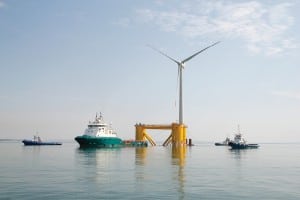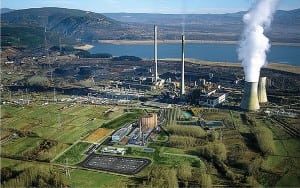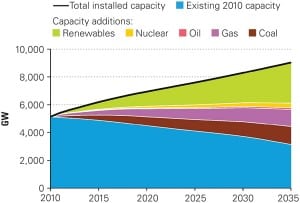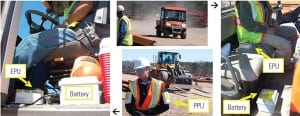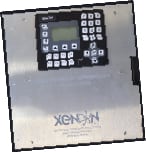POWER
-
O&M
Condenser Backpressure High? Check Vacuum System Sizing
In a power plant, the primary use of vacuum systems is to remove air and other noncondensable gases from the shell side of the condenser in order to maintain design heat transfer and thus design vacuum. If holding condenser vacuum is a persistent problem, one often-overlooked cause is an inadequately sized vacuum system.
-
Wind
Novel Floating Wind Turbine Deployed in the Atlantic
A semi-submersible structure supporting a 2-MW wind turbine was towed nearly 350 kilometers (217.5 miles) to water depths of about 35 meters (114.8 feet) into open Atlantic waters and deployed off the coast of Aguçadoura, Portugal, last November.
-
O&M
Avoiding Flow-Induced Sympathetic Vibration in Control Valves
Compressible fluid flow through control valves will inevitably cause some form of flow-induced vibration in the fluid system. Identifying the type and cause of the vibration requires detective work. Determining the design changes required in the valve and fluid system to prevent the vibration from occurring requires advanced analytical techniques.
-
Coal
One Step Forward, Two Steps Back for CCS Projects
Last December, as Spain’s national carbon capture and storage (CCS) research laboratory Fundación Ciudad de la Energía (CIUDEN) began a much-watched testing phase of oxycombustion in its 30-MWth circulating fluidized bed (CFB) boiler in Cubillos del Sil, Vattenfall scrapped the €1.5 billion ($2 billion) Jänschwalde CCS demonstration project that it had planned to build and begin operating by 2015 in the German federal state of Brandenburg.
-
News
Handheld Fluorometer
Turner Designs has introduced the Opti-Check Handheld Fluorometer for performing system verifications for industrial water process control applications. The Opti-Check is a small, lightweight, highly durable handheld fluorometer that is ideal for quick measurements in the field. Configurable for either PTSA or Fluorescein as well as both dyes, the Opti-Check enables monitoring of either cooling […]
-
Coal
World Energy Outlook Forecasts Great Renewables Growth
Driven by policies to limit carbon emissions, as well as government subsidies, the share of worldwide nonhydro renewable power is set to grow from just 3% in 2009 to 15% in 2035, the International Energy Agency (IEA) forecasts in its recently released World Energy Outlook 2011. Under the same scenario—which assumes that carbon pricing, explicit […]
-
O&M
Real-time Proactive Safety in Construction
For each of the past 10 years, nearly 1,200 U.S. construction workers have died as the result of injuries received on the job. Of these fatalities, 25% involved heavy equipment—most categorized as struck-by incidents. Remote sensing and visualization technology promises to improve worker situational awareness on congested and busy work sites.
-
Coal
Australia Levies Landmark Carbon Tax
After more than a decade debating whether to pass a carbon-limiting law, Australia’s Senate in November voted in a landmark bill that will impose a price on carbon emissions. The country, which accounts for just 1.5% of global carbon emissions, but which is the world’s highest emitter per capita because 80% of its power comes […]
-
News
A Wireless Cellular Controller
Xenon has introduced the T925 Wireless Cellular Controller for connecting remote sites with central control and monitoring stations through cellular networks. A T925 remote communications network eliminates the need to make hardwired Ethernet connections to the Internet or an intranet at each remote site and the central control and monitoring station. The network operates from […]
-
Nuclear
NRC to Implement Lessons Learned from Fukushima
The U.S. Nuclear Regulatory Commission (NRC) in October directed staff to begin implementing seven safety recommendations put forth by the federal body’s Near-Term Task Force on lessons learned from the nuclear accident at Tokyo Electric Power Co.’s Daiichi power plant in Japan’s Fukushima prefecture last March. The recommendations affecting all 104 nuclear reactors (Figure 1) […]


